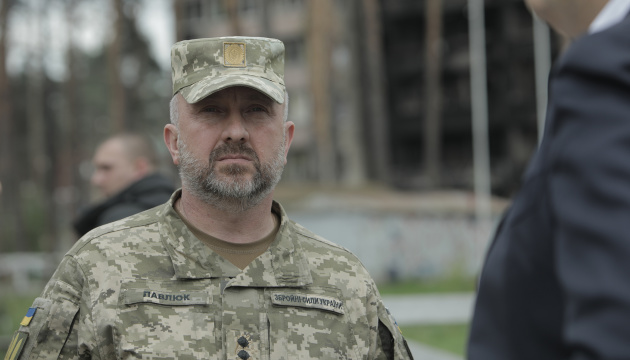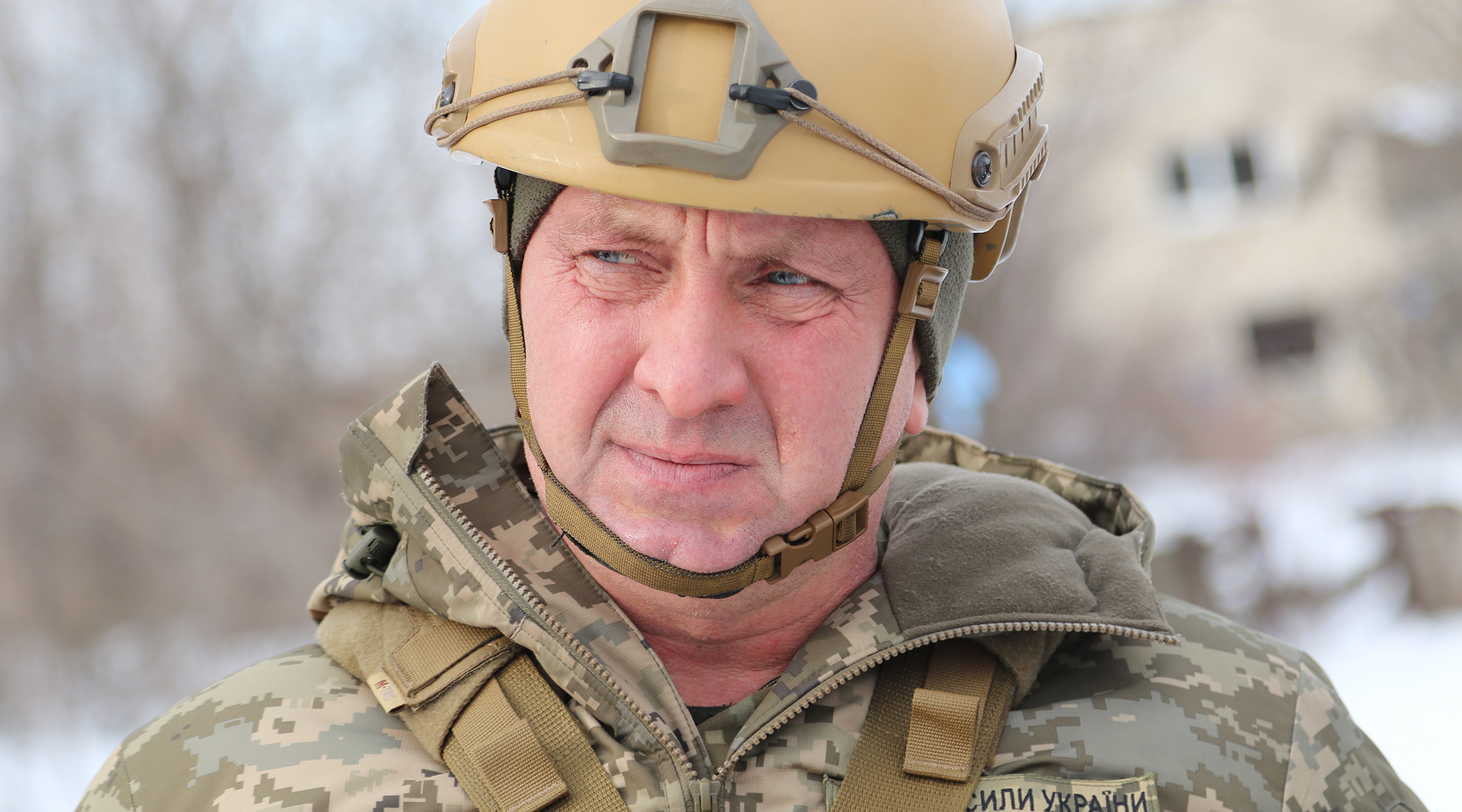
Oleksandr Pavlyuk, Lieutenant General of Ukraine's Armed Forces, Hero of Ukraine
If I wasn't with my soldiers during fierce battles, they wouldn't see me as commander
Eight years ago, on August 20, 2014, Ukrainian soldiers and officers first engaged in battle with regular units of the Russian army. Oleksandr Pavlyuk, Lieutenant General of the Ukrainian Armed Forces, Hero of Ukraine, then commander of the 24th Mechanized Brigade named after King Danylo, recalls those days and ponders why a retreat from positions is not always a defeat and why Ukrainian commanders are strong.
Donbas. A hot and tragic August 2014. Back then, the Ukrainian Armed Forces were going through not the best times. Under the slogans of many politicians that we have no enemies and we do not need a powerful army, the best military equipment was sold out, and combat units were reduced. Consciously or unconsciously, the army was being brought to a non-combat-ready state.
But despite all that, professionals remained in the ranks and they did everything to preserve the equipment and save the military collectives and combat traditions. You could count on them in the most difficult moment, and it was they who preserved that spirit, the moral strength that enabled us to resist the Russian army for eight years and force the "world's second army" to retreat even after the beginning of an all-out invasion.
Following the appearance of "little green men" in Crimea, I received an order to bring my brigade into full combat readiness. A few days later, a battalion tactical group, mainly staffed by contract soldiers, was ready to perform the assigned tasks. We came forward and took up defensive positions in the Sumy region in order to prevent the attack of a powerful Russian group stationed on the border with Ukraine and ready to move to Kyiv. During March-April, we prepared defensive lines against the enemy that outnumbered our forces by ten to one. We did everything to make the enemy understand that, despite their great advantage, it will not be easy for them to defeat us.

In May, we received a new order, and from that moment on, the 24th brigade participated in the Anti-Terrorist Operation. Then there was fighting in Chervonyi Lyman, the battles of Yampil, Zakitne, the first combat losses, the liberation of Sloviansk, the battle of Siversk, the liberation and holding of the Siversk-Bakhmut line, the liberation of Lysychansk and many settlements along Luhansk. If it were not for regular Russian units, which had several dozens of times the advantage both in terms of manpower and equipment, the war would have ended already in August 2014 with our victory.
But the largest and bloodiest battles for the 24th brigade were the battles near Luhansk. At the end of July, after the liberation of Lysychansk, the brigade, without the 2nd battalion tactical group, which at that time was in another group, made a march of more than one hundred kilometers and reached the border south of Luhansk. Then, continuing to hold our occupied positions, we liberated the settlements of Khriashchuvate and Novosvitlivka after heavy, exhausting battles. In fact, we closed the ring around Luhansk. Aware of the danger of complete encirclement, the enemy made desperate attempts to knock us out of these settlements. Powerful, prolonged artillery fire, tanks, deterring attacks, during which the enemy did not count their losses. The enemy completely destroyed all the buildings in Khriashchuvate with artillery fire. There was no longer any physical possibility of fighting from cover. But people withstood.
Eventually, the enemy stationed in Luhansk began to exhale. Then an attempt was made to completely encircle the brigade.
On August 20, starting at 4 o'clock in the morning, the enemy fired at our strongpoints using artillery for two hours. A cannonade that does not stop for a moment, hundreds of shells and mines, rockets, and after that a tank attack. There was no other way out but to withdraw, because both fortifications and equipment were destroyed by enemy fire. Subsequent events proved that it was the right decision. Having quickly oriented ourselves on the terrain and regrouped, we ourselves imposed a battle on the enemy, which he definitely did not expect. As a result, the Russians retreated, suffering significant losses, and we restored our positions on the previous lines.
I did not accidentally use the word "Russians" here. The whole world continued to hear about "tanks from the [Russian] defense industry" and "LPR/DPR militiamen." And on this day, based on the documents and maps in the captured enemy equipment, we clearly saw that in front of us were regular Russian units - the Air Assault Division stationed in Pskov. We read from these documents that on August 12, they were at their permanent base, and already on August 18, they crossed the border of Ukraine. It was in this battle that one of the enemy's groups, having suffered huge losses, completely lost its fighting capacity and was withdrawn to Russian territory. However, everything did not end there. Having moved new military units, the enemy again tried to destroy our units. But we managed to figure out the enemy's maneuver in a timely manner, deliver a fire strike and withdraw our units from the encirclement.
Then there was the battle of the Luhansk airport.
Units of the 80th Brigade held positions here. Because of constant artillery fire, the paratroopers lost all of their combat equipment and were surrounded by the enemy, but continued to hold their positions. For two days, the artillerymen of our brigade prevented the enemy from entering the airport. But it became clear that further fighting at the airport was impossible. The decision was made to break through to our units. The armored group of the brigade broke into the airport. The guys thus created the conditions for the 80th brigade to avoid encirclement. Much has been said about the Donetsk cyborgs. The defense of the Luhansk airfield was no less heroic, and the exhausted men, on the edge of their last strength, managed to return to their group.
Meanwhile, the enemy was constantly renewing its forces. We were incredibly exhausted after two months of fierce daily battles. The probability of our encirclement and destruction grew every day. Therefore, the main thing at that time was to save people and combat-ready equipment in order to hold off the enemy at a new defensive line. We retreated in an organized manner. A retreat is not always a defeat. The new defensive line was beyond the Siverskyi Donets River.
The enemy tried to destroy us there as well, already in the base camp in the settlement of Dmytrivka. We foresaw such a scenario, dispersed equipment and personnel. Unfortunately, the strike was so powerful that the enemy managed to destroy part of our equipment. But we saved people again.
It was the most important thing for me personally. Every saved life of a soldier or an officer is evidence that the value of a person is incomparable to the most modern technology. It is also a guarantee that we will win in future battles.
Even then, we were clearly aware that those fighting us were not miners, but a professionally trained army. This was evident from the first combat clashes. Competently equipped strongpoints, roadblocks, skillful use of mine-explosive barriers. Prepared sabotage and reconnaissance groups, accurate artillery and mortar strikes — all this indicated not only the high professional skills of enemy forces, but also their combat experience.
Unlike their bloody experience gained all over the world, we showed our ability to work in an organized manner, thoughtfulness of actions, desperate courage of soldiers and cheering of commanders for soldiers' lives. As a brigade commander, I, for example, was always with my subordinates during the fierce battles of August and all other months of that year, 2014 and if I wasn't with them, they wouldn't see me as a commander. They got used to my voice on the walkie-talkie and were calm only when they heard it. When I once fell ill, the guys, not hearing my voice on the radio for a day, began to worry about where the commander was and why he could not be heard. So when I say that our relationship was built and is built on mutual respect and trust, these are not empty words. Our army is based on this.
That's why they cannot defeat us.
